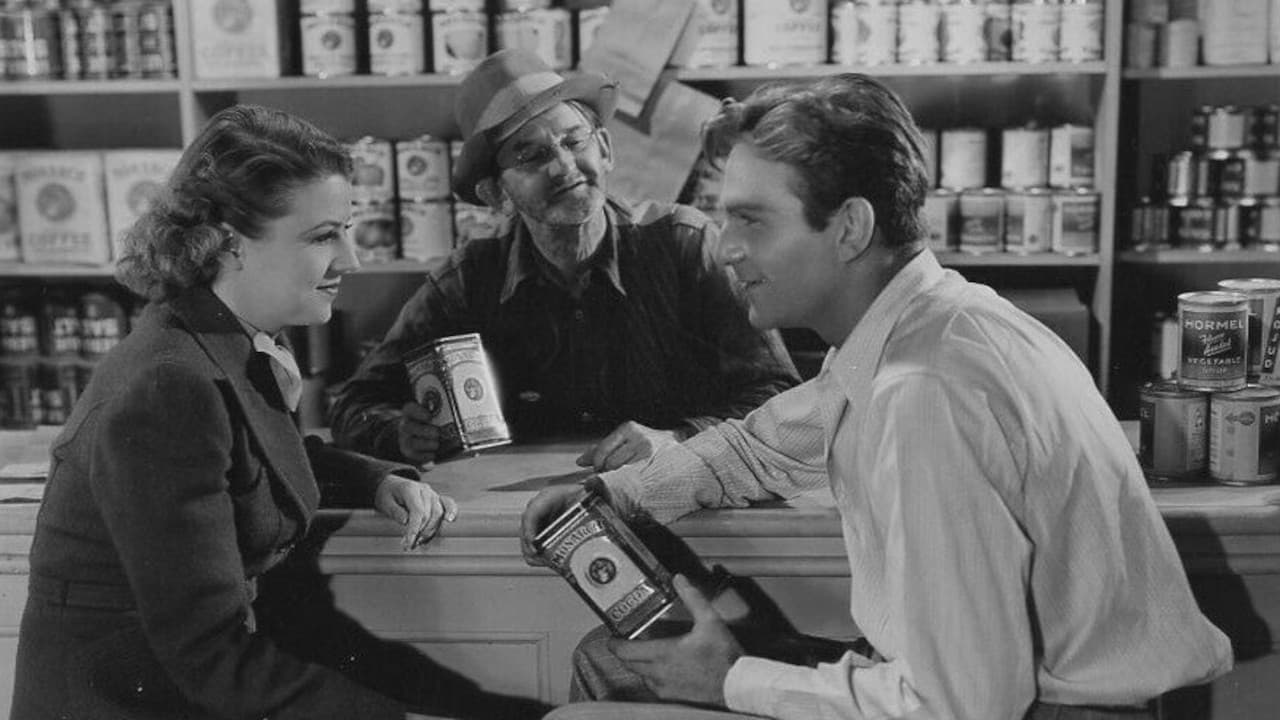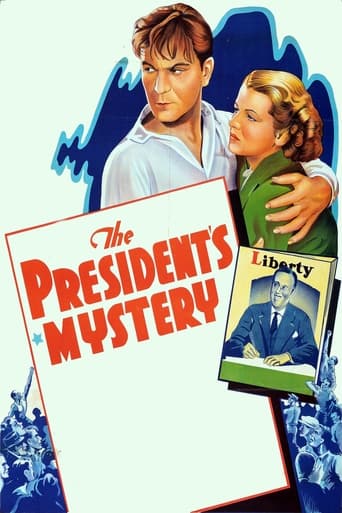

THE PRESIDENT'S MYSTERY is a 1936 potboiler solely of interest for having a story written by none other than Franklin D. Roosevelt, the only time a film in history can boast being written by a president as such. Whether it's a good story or not is another question, one that only the viewer can decide.The film's protagonist is a millionaire who has made some bad decisions in life, leading him to decide to just disappear and reappear elsewhere with a new, assumed identity. Intrigue proceeds to follow him. There's some mystery and comedy but the film never really succeeds in either genre, instead coming across as bland and instantly forgettable.
... View MoreI saw an obviously truncated version of the picture with a running time of about fifty two minutes whereas the original length states eighty minutes. That's quite a bit of missing footage and may account for the question mark ending. It seemed to me that the hero Blake (Henry Wilcoxon) saved the Springvale Cannery by rallying the townfolk while his nemesis George (Sidney Blackmer) basically did the same thing by bringing in outside agitators to stir up the locals. So either way the citizens got their cannery back by pulling together against the corporate moneyed interests and their slick lawyers.The hitch in the story occurs when James Blake is accused of murdering his wife after closing out all of his investments and bank accounts. You have to admit it did look suspicious that he disappeared even though he was testing a theory posed by FDR on whether someone with millions could simply vanish with all that money. Back in the Thirties it might have still been possible, but then again, John Corzine lost a billion dollars about a year ago and says he doesn't know where it went and it doesn't look like he's been called on it. So who knows.Anyway, actor Wilcoxon who I haven't seen before, was fairly effective using the old Clark Kent ruse with the glasses to appear like two different characters. Betty Furness appears as his country sweetheart in an unconvincing role, perhaps offering a clue as to why she made a bigger splash in the world of consumer affairs. Though the story's a bit muddled it's entertaining enough nevertheless, and there's even some unexpected comic relief from Blake's butler Roger (Barnett Parker) who amuses with his upper crust style.
... View MoreMild spoilers. How Republicans must have hated this! It might seem innocuous today, but this is very much a story about the little guys being screwed by big business. Blake lobbies successfully to defeat a bill that would help small businesses stay afloat during the depression. Already disenchanted with his life, he decides to start over when he sees the effect his work has on a small agricultural community. The version I saw ran 94 minutes, much of it exposition. The latter half of the movie seemed rather rushed. The relationship between Blake and Charlotte doesn't develop, it is just presented without explanation. All in all, a pretty good 30's film.
... View More"The President's Mystery" isn't really a mystery, but it's a well-made B-picture with an interesting premise. President Franklin D. Roosevelt was fond of reading murder mysteries. On 12 May 1935, at a White House luncheon, FDR offered his lunch guests an idea for a mystery: How could a millionaire disappear and start a new life for himself, under a new identity, yet manage to take his wealth with him? One of the guests at that luncheon was magazine editor Fulton Oursler, who wrote mystery stories under the pseudonym 'Anthony Abbot'. Intrigued by FDR's idea, Oursler contacted five other authors (including S.S. Van Dine, creator of the popular Philo Vance mysteries), and they set out to write a novel that could answer FDR's question. This was published as "The President's Mystery Story", with FDR listed as co-author (although he contributed only the premise). It is not a very good book, due to its patchwork structure: the various chapters are written by different authors of radically different styles and widely varying talent. But largely due to its novelty appeal and FDR's personal popularity, "The President's Mystery Story" became a best-seller.This movie is the film version, with a title card in the opening credits explaining FDR's participation. The screenplay was written by Lester Cole and the grossly overrated Nathanael West, who brings none of his own sardonic viewpoint to this movie.Industrialist James Blake (the underrated actor Henry Wilcoxon, who later submerged his career into C.B. DeMille's) has messed up his personal life and he wants to start over in a new identity ... but he doesn't want to lose the fortune he's already compiled. He hits upon a very clever plan which might actually have worked in the 1930s, but which nowadays (with computer databases and biometric I.D.) couldn't possibly succeed. Blake locates a crooked investment firm run by two con men (one of them is played by Charles Williams, the meek little actor who played Eustace Bailey in "It's a Wonderful Life"). Claiming to have enough evidence to put the crooks in prison, Blake bullies them into abandoning their investment firm without dismantling it. Blake then secretly takes over the brokerage without any paperwork to document the transfer. Operating in the open, he then proceeds to invest his own fortune in the crooked brokerage house ... thus neatly robbing himself! (But how does he withdraw the money after he deposits his cheques?)Because Blake is publicly perceived to lose his fortune, nobody is surprised when he vanishes ... an apparent suicide. He establishes a new identity with plausible ease (again, this was before high-tech I.D.) and it looks like he's accomplished his goal. But then something goes wrong...There are several good performances here, most notably Wilcoxon's, Sidney Blackmer's and a comic turn by Barnett Parker in his usual silly-ass Englishman mode, and a performance by the underrated John Wray. Byron Foulger gives his usual inept performance as a milquetoast. Betty Furness is dull and unattractive, as usual for her.I'll rate this movie 5 out of 10. FDR's participation is almost nonexistent, and co-screenwriter Nathanael West's influence on the material is minor. But this modest film has some genuine merits and an unusual story; I recommend it.
... View More